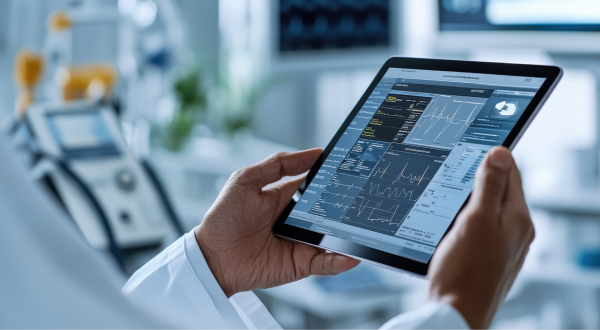An innovative, bespoke solution for optimising health resources
Reading time: 3 min
Since 2021, the Portuguese Ministry of Health has been using Intelligent Patient Personalised Care (IPPC), an innovative solution designed and developed by Axians to help with early detection of acute symptoms.
![]()
Generally speaking, life expectancy is increasing, along with population size and average age. But as life expectancy increases, so does the incidence of chronic illnesses and the overall burden on healthcare systems. It is therefore crucial to provide these patients with high-quality care without compromising the sustainability of the worldwide health system. Technology can help with this, particularly through the Internet of Things (IoT) and artificial intelligence (AI).
Having access to critical patient information at the right time enables medical practitioners to monitor more patients while also being able to devote more quality time to each of them, which improves overall health outcomes.
For patients, being closely monitored by a health professional in the comfort of their own home can reduce their exposure to risks and their stress levels, leading to fewer hospital readmissions and increased efficiency in the healthcare system.
Digital medical monitoring
Digital medical monitoring is already a reality. Patient health can now be constantly monitored and assessed by health professionals. This is the idea behind Intelligent Patient Personalised Care (IPPC). This solution assists with real-time monitoring and also predicts acute symptoms through data intelligence.
“A cloud solution that collects and processes health data in real time”
In 2021, Axians Digital Consulting PT developed and implemented IPPC in partnership with the Portuguese Ministry of Health (SPMS). “IPPC is a cloud solution that collects and processes health data from connected IoMT [Internet of Medical Things] devices in real time”, says Hugo Dionísio, head of Axians Portugal’s Data Driven Business Unit.
“It generates information based on customised rules defined by the health professional for each individual patient, predicting and alerting to acute symptom behaviour patterns with the help of AI and specialised automatic learning modules.”
New functionalities to come
Patients download and install the mobile application on their smartphones, and it then guides them through completion of the integration process and connection to the necessary IoMT devices. A healthcare professional can then monitor each patient on the platform and analyse their compliance with treatment, with an alert generated automatically when a predefined rule is triggered or an acute event occurs.
“The healthcare authorities can also monitor key performance indicators (KPIs) for each programme, study the overall response and increase monitoring nationally or for a specific region via a smart interface”, continues Hugo Dionísio. “All information circulating on the platform is securely masked and circulates/resides in a hybrid or cloud infrastructure controlled by the healthcare provider.”
Forthcoming developments in IPPC are focused primarily on new functionality, “Notably based on assisted intelligence components and the expansion of our IoMT integration spectrum with new medically certified devices”, says Hugo Dionísio, adding that “Dedicated applications will be developed for new healthcare programmes (diabetes, sleep apnoea, hypertension, etc.).”
13/10/2022





